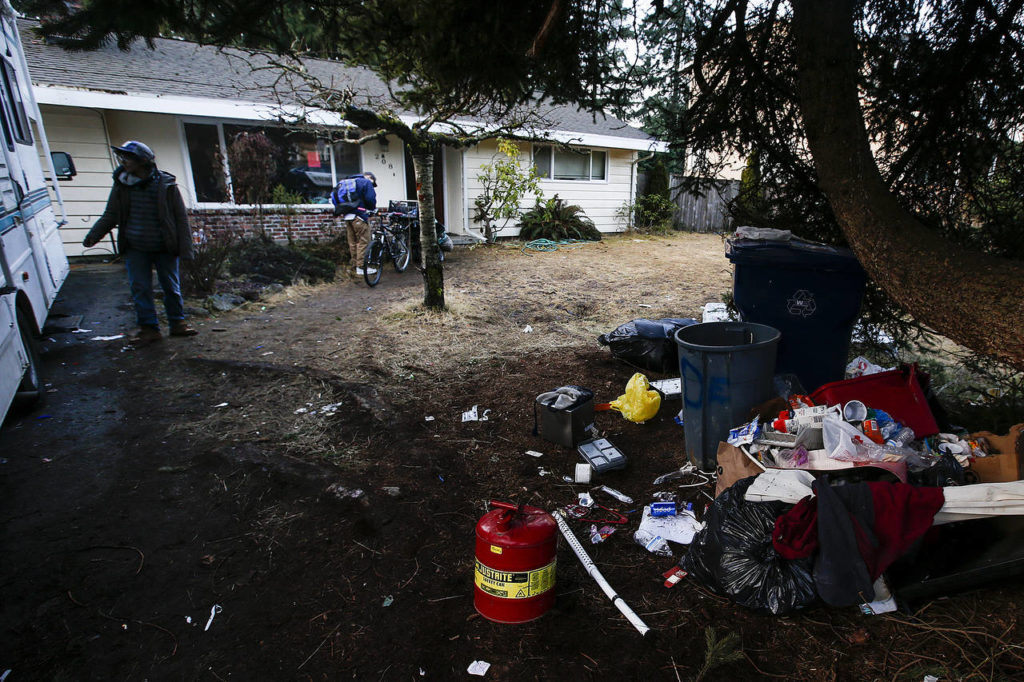EVERETT — A new law drafted by the Snohomish County Council would target nuisance properties where owners allow drug use, prostitution and other kinds of criminal activity to fester.
The property owner or manager in some cases could face a fine of up to $100 per day. If the law passes, it would allow the county to seek a court order tailored to stop chronic problems. Law enforcement officials could gain the right to inspect the property and check for compliance with the order.
For unpaid fines, the county could seek a lien.
“We’re looking at criminal activity that is having a negative impact on neighboring properties,” County Councilman Nate Nehring said. “It really gives some teeth to go after these folks who are causing the nuisance for the neighborhood.”
While the law aims to arm the county with a means of enforcement, the goal is to encourage property owners and managers to take care of nuisances voluntarily.
Nehring, who represents north Snohomish County, said the new law is patterned after, but not identical to, ordinances on the books in Everett, Monroe and other local cities, as well as laws used by other counties.
A hearing is set for 10:30 a.m. March 21 in council chambers.
Councilman Sam Low agrees the law is needed. His district includes Lake Stevens and parts of southeast Everett, plus the U.S. 2 corridor all the way past Index.
“I’ve done some ride-alongs with our deputies and have seen some pretty shocking things, especially in east county,” Low said during a recent council discussion. “From my perspective, things that I would expect to see in a third world country, not right here in a district that I represent.”
Low has some concerns, though. Namely that the law, in his view, “does cross the line a little bit on property rights.”
“I’m supportive of it, you just have to be cautious,” he said.
Snohomish County’s Drug & Gang Task Force backs the proposal.
Often, nuisance properties are owned by banks because of foreclosure, or by someone who lives in another state. In other cases, the property has been largely abandoned because the owner has died, is incapacitated by a medical condition or in prison. Some common problems law enforcement officials encounter at such properties include possession of stolen property and illegal weapons, animal cruelty, gang activity and disorderly conduct.
If the nuisance-property law passes, police and prosecutors would have discretion to consider any efforts the landowner or manager has taken to address the problems. They also could take mental or physical disabilities into account.
Any criminal cases against individuals would proceed separately in court. The county also could pursue land-use violations separately, through its code-enforcement system. That might include things such as junkyard conditions, unpermitted buildings or illegally occupied motorhomes.
The law lists specific crimes that qualify as a nuisance. The law would apply to properties where at least two court-ordered search warrants for drug offenses have been executed within a 12-month period. It would apply to houses or apartments with four or more documented nuisances within a 90-day period, or eight or more in a one-year period.
With the new rules, the county could close off the property in some cases. That might take the form of voluntary work in cooperation with the owner or manager, or a court order if the owner or manager is unwilling or unable to work through the issues.
The court also could put owners on the hook for the county’s — and by extension, taxpayers’ — costs. County-issued business licenses associated with nuisance properties could be revoked or suspended.
Noah Haglund: 425-339-3465; nhaglund@heraldnet.com. Twitter: @NWhaglund.
Talk to us
> Give us your news tips.
> Send us a letter to the editor.
> More Herald contact information.





























